
INDIAN JOURNAL OF ANIMAL SCIENCES
Scope & Guideline
Transforming animal sciences with impactful research.
Introduction
Aims and Scopes
- Animal Health and Disease Management:
The journal publishes research focused on the diagnosis, treatment, and prevention of diseases in various livestock species, including cattle, buffalo, sheep, goats, and poultry. This includes studies on infectious diseases, parasitology, and veterinary pharmacology. - Animal Nutrition and Feed Science:
Research articles address the nutritional requirements of different animal species, exploring the effects of various feed components, supplements, and dietary strategies on growth performance, reproduction, and overall health. - Genetics and Breeding:
The journal features studies on genetic diversity, breeding strategies, and the genetic basis of traits in livestock. This includes molecular genetics, marker-assisted selection, and the impact of genetic factors on productivity and resilience. - Animal Welfare and Behavior:
Research in this area examines the welfare implications of different husbandry practices, behavioral studies, and the effects of environmental factors on animal health and productivity. - Sustainable Livestock Production Systems:
The journal encourages research on sustainable practices in livestock production, including agroecological approaches, resource management, and the economic viability of various systems. - Emerging Technologies in Animal Sciences:
The journal is open to studies that incorporate modern technologies such as genomics, proteomics, and bioinformatics to advance understanding in animal sciences.
Trending and Emerging
- Climate Change and Its Impact on Livestock:
There is a growing focus on understanding how climate change affects animal health, productivity, and management strategies. Studies exploring adaptation mechanisms and mitigation strategies are becoming more common. - Antimicrobial Resistance in Livestock:
Research addressing antimicrobial resistance in animal husbandry practices is trending, reflecting global concerns about public health and the sustainability of animal production. - Precision Livestock Farming:
The integration of technology in monitoring and managing livestock health and productivity is an emerging theme, with studies focusing on data analytics, sensors, and automation in farming. - Functional Foods and Nutraceuticals in Animal Diets:
Research on the use of functional foods and nutraceuticals to enhance animal health and productivity is gaining traction, highlighting the importance of diet in livestock management. - Ethno-Veterinary Practices:
There is an increasing interest in exploring traditional and local veterinary practices, particularly in the context of sustainable animal health management and community-based approaches.
Declining or Waning
- Traditional Breeding Practices:
There has been a noticeable decline in research focused on conventional breeding practices, as the field has shifted more towards genetic innovations and molecular breeding techniques. - Non-Scientific Approaches to Animal Management:
Papers that rely on anecdotal evidence or non-empirical methods in animal management have decreased, as the journal increasingly favors data-driven and scientifically rigorous studies. - Animal Products Processing and Marketing:
Research related to the processing and marketing of animal products has become less prevalent, possibly overshadowed by more pressing concerns regarding animal health, genetics, and welfare.
Similar Journals

Translational Animal Science
Connecting Research to Real-World Applications in Animal ScienceTranslational Animal Science, published by Oxford University Press Inc, stands as a prominent journal in the fields of Animal Science and Zoology as well as Veterinary Sciences, achieving a commendable Q2 ranking in both categories for 2023. With an E-ISSN of 2573-2102 and transitioning to an Open Access model since 2017, this journal fosters accessibility and dissemination of vital research that bridges the gap between basic animal science and its practical applications. The journal's significant impact factor, where it ranks in the 71st and 65th percentiles respectively for Veterinary and Agricultural and Biological Sciences disciplines, highlights its importance as a resource for emerging trends and innovations in animal research. With submissions accepted until 2024, Translational Animal Science not only contributes to advancing knowledge but also aims to engage a broad audience of researchers, professionals, and students dedicated to improving animal health and welfare. Based in India, the journal serves as an essential platform for the exchange of scientific ideas that facilitate progress within these vital fields.
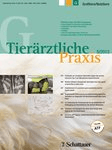
TIERAERZTLICHE PRAXIS AUSGABE GROSSTIERE NUTZTIERE
Innovating veterinary practices for better animal welfare.TIERAERZTLICHE PRAXIS AUSGABE GROSSTIERE NUTZTIERE is a pivotal journal in the field of veterinary science, focusing specifically on large animals and food production animals. Published by GEORG THIEME VERLAG KG, this journal has been a resource for veterinary professionals since its inception in 1996, delivering current research and practical insights to its readership through 2024. Despite its classification in the Q4 quartile for both Food Animals and Veterinary (miscellaneous) categories, the journal provides an essential platform for emerging studies, contributing to the interdisciplinary dialogue around veterinary practices. Researchers and practitioners benefit from the journal’s commitment to advancing knowledge, despite its modest rankings in Scopus where it stands at rank #150 in General Veterinary and #32 in Food Animals. While not currently offering Open Access options, the journals’ significant body of work remains an invaluable asset for those dedicated to enhancing animal health and welfare. TIERAERZTLICHE PRAXIS serves as a cornerstone for academic exploration and practical application in the veterinary field, fostering a deeper understanding of the complexities involved in animal care and management.
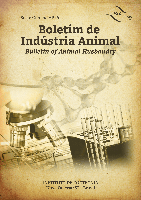
BOLETIM DE INDUSTRIA ANIMAL
Empowering Research for Sustainable Animal ProductionBOLETIM DE INDUSTRIA ANIMAL is a prominent academic journal dedicated to the field of animal industry, published by the Instituto de Zootecnia. As an Open Access journal since 1974, it provides a vital platform for researchers, professionals, and students to disseminate knowledge and advancements in animal production, husbandry, and veterinary sciences. With its commitment to enhancing the visibility and accessibility of research, BOLETIM DE INDUSTRIA ANIMAL encourages rigorous scientific inquiry and innovation within its community. The journal presents a rich repository of articles encompassing a wide range of topics related to animal science and industry practices. Published in Brazil and accessible globally, it aims to foster collaboration and knowledge exchange among scholars, ultimately contributing to the advancement of sustainable practices in the agricultural and animal husbandry sectors.

Frontiers in Animal Science
Exploring the frontiers of animal science and discovery.Frontiers in Animal Science is a pioneering academic journal dedicated to advancing knowledge and innovation in the fields of animal science and zoology. Published by FRONTIERS MEDIA SA in Switzerland, this open-access journal aims to bridge the gap between research and practice by providing a platform for impactful studies and discoveries. With an impressive Q2 classification in animal science and zoology for 2023, it ranks #222 out of 490 journals within the Scopus database, placing it within the 54th percentile of academic journals in its category. Since its inception in 2020, Frontiers in Animal Science has fostered interdisciplinary collaboration and innovation, encouraging researchers, professionals, and students alike to share their work and insights. By facilitating unrestricted access to quality research, this journal plays a crucial role in shaping the future of animal science and enhancing our understanding of animal biology and welfare.

Ankara Universitesi Veteriner Fakultesi Dergisi
Advancing veterinary knowledge for a healthier tomorrow.Ankara Universitesi Veteriner Fakultesi Dergisi is a prominent academic journal published by ANKARA UNIV, focusing on advancements in veterinary sciences and animal biology. Since its inception, the journal has been committed to disseminating high-quality research, featuring articles that span a variety of topics within veterinary medicine and animal science. With an ISSN of 1300-0861 and an E-ISSN of 1308-2817, this journal provides valuable insights into the latest research developments and trends, making it a critical resource for researchers, professionals, and students in the field. The journal has established itself within the scholarly community, achieving a Q3 rank in Animal Science and Zoology and a Q2 rank in Veterinary (miscellaneous) as of 2023, reflecting its growing relevance and impact. Positioned in Turkey, it serves as a vital platform for both local and international scholars to share innovative findings and foster collaboration. Enhancing its accessibility, the journal's content is available through various academic databases, ensuring that its readership can effortlessly access and engage with cutting-edge research.
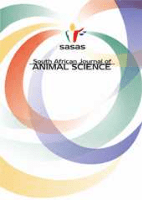
SOUTH AFRICAN JOURNAL OF ANIMAL SCIENCE
Elevating standards in animal husbandry and breeding practices.SOUTH AFRICAN JOURNAL OF ANIMAL SCIENCE is a leading scholarly publication dedicated to the dissemination of original research, review articles, and critical insights in the fields of animal science and zoology. Established in 1974, this journal is published by the South African Journal of Animal Sciences and has since become an essential resource for researchers and professionals in the field. The journal, which currently holds a Q3 ranking in Animal Science and Zoology as per Scopus rankings, aims to promote scientific knowledge and innovation in animal husbandry, welfare, nutrition, and breeding practices, with a particular emphasis on the South African context. The journal's rigorous peer-review process ensures high-quality research is shared widely among the academic community. Researchers and students alike will find valuable content and access options that support ongoing education and professional development in this vital area of study. For more information, interested readers can contact the editorial office at PO Box 13884, Hatfield 0028, South Africa.
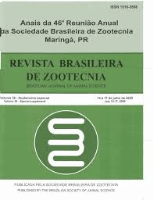
REVISTA BRASILEIRA DE ZOOTECNIA-BRAZILIAN JOURNAL OF ANIMAL SCIENCE
Connecting Research with Innovation in Animal SciencesREVISTA BRASILEIRA DE ZOOTECNIA - BRAZILIAN JOURNAL OF ANIMAL SCIENCE is a leading open-access journal published by the esteemed Universidade Federal Viçosa, dedicated to advancing the field of animal science and agricultural research in Brazil and beyond. With an ISSN of 1516-3598 and an E-ISSN of 1806-9290, the journal has been a crucial resource since its inception in 1996, now looking ahead to its continued contribution through 2024. As a Q3-ranked journal in Animal Science and Zoology, it provides a platform for high-quality research, encouraging the dissemination of cutting-edge studies and innovative methodologies. The journal's impact in the scientific community is further reflected in its Scopus ranking within the 46th percentile, evidencing its importance in the global discourse around animal science. For researchers, professionals, and students alike, REVISTA BRASILEIRA DE ZOOTECNIA offers a valuable opportunity to engage with timely, peer-reviewed content and contribute to the advancement of knowledge in animal sciences.
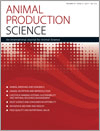
Animal Production Science
Fostering Innovation in Livestock Management and Food QualityAnimal Production Science, published by CSIRO PUBLISHING, is a prestigious journal that caters to the fields of Animal Science and Food Science. With an ISSN of 1836-0939 and an E-ISSN of 1836-5787, the journal features high-quality research and reviews that are crucial for advancing the understanding and innovation of animal production systems. Recognized within the Q2 category of both Animal Science and Zoology, and Food Science, as per the 2023 Journal Rankings, Animal Production Science has achieved commendable Scopus rankings, placing it in the 68th and 48th percentiles in its respective categories. With converged years from 2009 to 2024, and an aim to disseminate knowledge that promotes sustainable practices, the journal is pivotal for researchers, professionals, and students devoted to animal production and food security. Exploring topics from livestock management to food quality, the journal offers valuable insights for enhancing productivity while considering welfare and environmental impact. For those seeking accessibility, the journal provides various open access options, encouraging a wider reach of its scholarly articles.

ZUCHTUNGSKUNDE
Connecting researchers to enhance animal sciences.ZUCHTUNGSKUNDE is a distinguished journal published by EUGEN ULMER GMBH CO that has been advancing the field of animal science and zoology since its inception in 1977. With its ISSN 0044-5401 and E-ISSN 1867-4518, this journal provides a vital platform for researchers, professionals, and students in the realms of animal genetics, breeding, and veterinary studies. Although currently categorized in the fourth quartile for both Animal Science and Zoology and Food Animals, ZUCHTUNGSKUNDE serves as an essential resource for sharing innovative research findings and methodologies. Located in Stuttgart, Germany, the journal is strategically positioned to foster collaboration within the European agricultural and biological sciences community. Researchers are encouraged to contribute their insights to enhance the understanding of breeding practices and improve animal welfare and productivity. Despite its challenges, ZUCHTUNGSKUNDE remains committed to addressing key issues within its scope, paving the way for future advancements in animal science.

TROPICAL ANIMAL HEALTH AND PRODUCTION
Championing advancements in tropical veterinary science.Tropical Animal Health and Production is a prominent academic journal dedicated to advancing the field of animal health and production in tropical environments. Published by Springer, this journal has been a pivotal platform for researchers and professionals since its inception in 1969, serving as a vital resource for innovative studies and advancements up to 2024. With impactful research findings, it holds a respectable Q2 ranking in both Animal Science and Zoology, and Food Animals, demonstrating its significance within these fields. The journal’s commitment to high-quality research is further reflected in its Scopus rankings, with a notable position in Agricultural and Biological Sciences and Veterinary Food Animals. Although it is not an open-access publication, the insights and knowledge shared within its pages are invaluable for those engaged in tackling the challenges of animal health and production in the tropics. Researchers and students will find Tropical Animal Health and Production an essential source for the most recent advancements and practices in veterinary science and animal care for food-producing species.